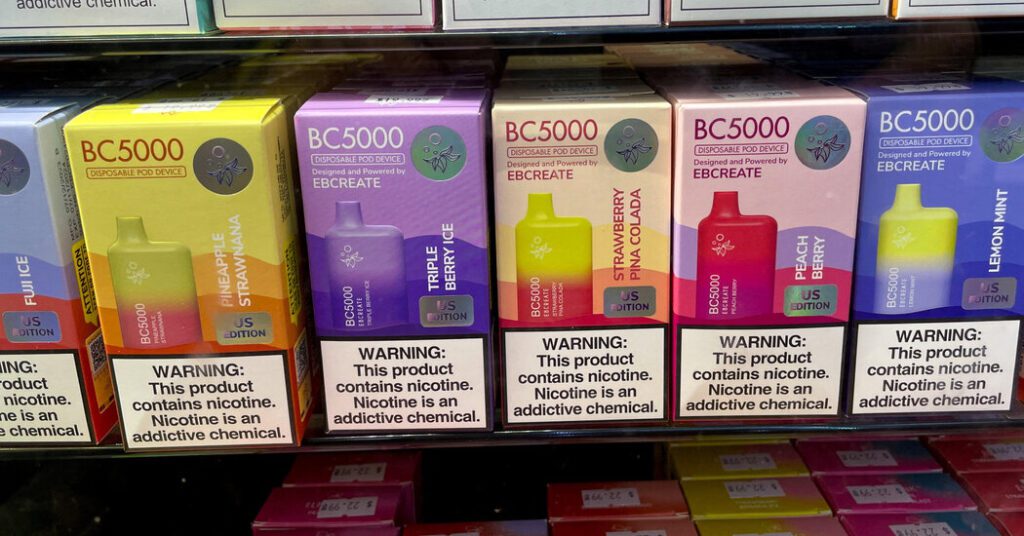Anti-smoking groups, lawmakers and the tobacco industry are calling on federal authorities to stop the proliferation of e-cigarettes popular among teenagers, and a multi-agency law enforcement coalition is launching an effort to tackle the rampant market for illegal e-cigarettes.
The Justice Department has announced a new effort that is expected to target fruit- and candy-flavored e-cigarettes, which contain high concentrations of addictive nicotine.
The new coalition, which includes the Bureau of Alcohol, Tobacco, Firearms and Explosives, the U.S. Marshals Service, the Federal Trade Commission and the U.S. Postal Service, will leverage federal laws that can include significant fines and prison time. “Unlicensed e-cigarette and vaping products continue to endanger the health of Americans across the country, especially children and young people,” said Acting Attorney General Benjamin C. Mizer.
Until now, enforcement has mainly consisted of the Food and Drug Administration issuing warning letters and limited fines to a variety of sellers, including operators of gas stations and convenience stores, and ordering them to stop selling products.
The FDA's efforts have been criticized as a failure by lawmakers who have urged the agency to do more to prevent illegal e-cigarettes from entering the US.
Traditional tobacco companies, including Reynolds American, have also asked the FDA, which regulates tobacco, to ban illegal products that compete with their e-cigarettes. But their calls to crack down on flavored e-cigarettes end at the U.S. border. Reynolds parent company British American Tobacco said it sells its Vuse Go e-cigarettes in flavors like mango ice and blue raspberry in 46 countries.
Youth e-cigarette use has fallen since a peak reported in a national survey of teenagers about five years ago, but public health experts remain concerned about the risk of nicotine poisoning in adolescent brains, in part because many illicit products contain unknown concentrations and chemicals.
Sen. Dick Durbin, D-Ill., the majority whip, is hosting a Judiciary Committee hearing on Wednesday to focus on combating youth e-cigarette use and improving law enforcement. Senior officials from the Department of Justice and the FDA have been invited to testify.
“I am pleased that my calls for increased enforcement against unauthorized e-cigarettes have been heard and additional resources will be dedicated to addressing the flood of illegal products entering the marketplace,” Durbin said in a statement Monday. “I hope this will bring about meaningful change – our children's health depends on it.”
Public health groups also welcomed the new initiative.
“Law enforcement intervention is necessary to remove these products from the market, and it must happen immediately,” said Erica Seward, assistant vice president for advocacy at the American Lung Association. “There's a reason these products are not legally sold in the United States, and that's because they are so appealing to children.”
The popularity of large-capacity e-cigarettes, available in a variety of flavors including strawberry ice cream, Hawaiian punch and juicy peach, has infuriated anti-smoking groups. In the most recent annual government survey, about 10% of high school students and about 5% of middle school students reported using an e-cigarette in the last month.
Surveys report a strong preference for flavors among young people, and in interviews, they say they enjoy trying and sharing novel blends. According to data provided by the CDC Foundation, a nonprofit organization that supports the Centers for Disease Control and Prevention, there were approximately 6,000 unique vape varieties available on the U.S. market as of the end of 2023. Sales of flavored vapes have skyrocketed in recent years, from approximately $217 million at the beginning of 2020 to approximately $400 million by the end of 2023.
During that time, e-cigarette devices have also gotten larger and contained more nicotine, allowing up to 8,500 puffs per device, equivalent to the nicotine content of a pack of cigarettes.
To date, the FDA has approved the sale of 23 tobacco-flavored e-cigarette products, including Altria's NJOY and RJ Reynolds Vapor Company's Vuse products.
The FDA is still reviewing Juul's e-cigarette application, but last week reversed a previous order that denied the company permission to sell e-cigarettes.
Traditional tobacco companies have joined public health groups, albeit awkwardly, in urging the FDA to step up its fight against illegal e-cigarettes, which account for the majority of total market sales.
Reynolds on Monday praised the FDA's action. “While the FDA has sent warning letters to companies that manufacture illegal e-cigarettes, our biggest problem is the lack of comprehensive enforcement,” company spokesman Luis Pinto said in a statement. “Further action must be taken to detect and seize illegal disposable e-cigarettes, protect public health, and prevent them from becoming available to young people.”
The Campaign for Tobacco-Free Kids also praised the new law enforcement agency and called for product confiscation, import restrictions and criminal prosecutions.
“This measure will only be effective if specific, comprehensive enforcement actions are implemented immediately,” said Yolanda C. Richardson, the campaign's executive director.

